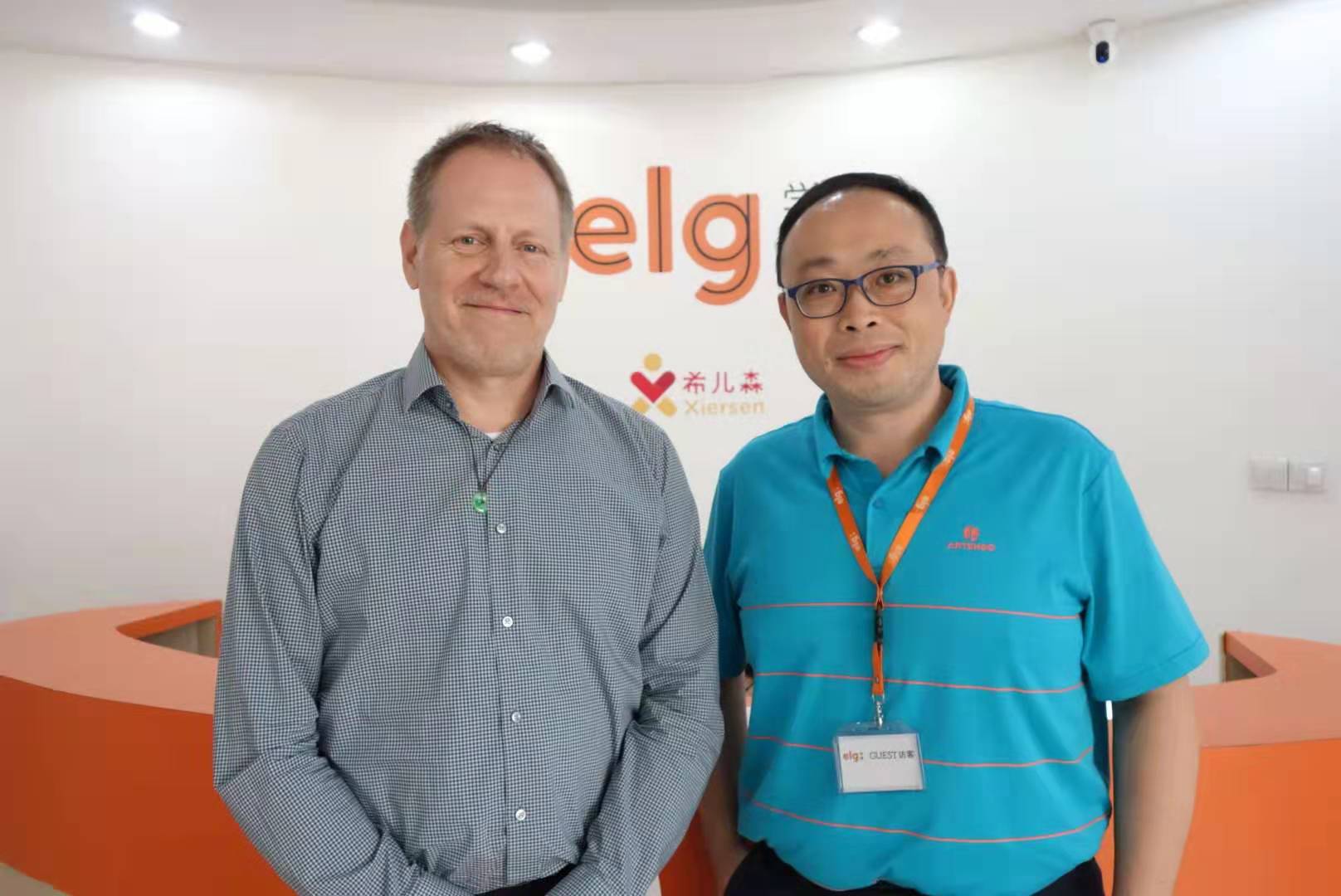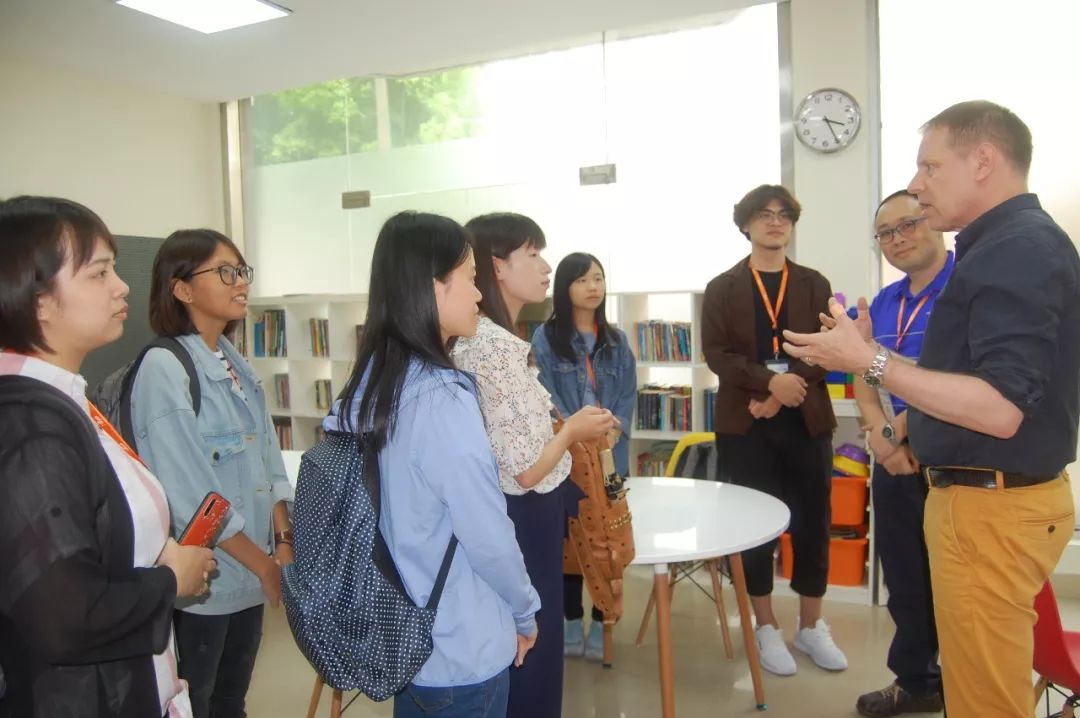Professor Tsai Meng-Ju, from the Department of Speech-Language Pathology & Audiology, Taiwan Chung Shan Medical University, had a meaningful talk with one of ELG’s founders, Andrew Hill. In this article, we hear from an experienced speech-language specialist about the striking aspects of ELG’s full-time program, what makes a good speech-language pathologist, and the future trends for special education and speech-language therapy.

In recent years, mainland China has been paying more attention to special needs – its challenges, issues and interventions available. Many young people are becoming increasingly interested in the field of speech language pathology. What kinds of personalities and qualities are needed to become a speech therapist? What is the current intervention environment and what does its future look like?
Andrew Hill:
What kind of personality and qualities do speech-language pathologists need?
Prof. Tsai:
First of all, students need to be interested in people. You must have a sense of curiosity and be interested in communicating with people. Speech-language pathologists work with people on a daily basis. Intervention becomes challenging without clear and effective communication.
Secondly, students need to be empathetic. Therapists should be able to see things from their clients’ and families’ perspectives. Often, families with children who have special needs face many challenges in life. The demands on the primary caregivers are high, and financial costs are also higher. Therapists need to put themselves in their clients’ shoes to really understand their needs. By understanding their clients better, therapists are also able to recommend supplementary services, such as physical and occupational therapy to further benefit the client.
Andrew Hill:
What is the future trend of speech-language therapy in Asia?
Prof. Tsai:
In recent years, Taiwan has been actively promoting long-term care [1]. Long-term care is not only for the elderly, but also for people with moderate and severe disabilities. They may not be able to physically go to the hospitals or organizations themselves, so professionals must go to their home to deliver services.
Many skills that therapists teach clients may not be practical in their everyday lives. Clients may have a hard time integrating what’s been taught during therapies in their school and workplace setting. Many therapists are not aware of the real-life environments in which clients live. Only when therapists see how their clients lead their daily lives, can they adapt interventions to make them more useful to their clients.

For many parents, choosing the right educational setting for their child is a very important decision. For parents of children with special needs, there are often additional areas to consider, such as educational provision, therapy sessions, and fostering independent living skills that will facilitate integration into the wider society.
Andrew Hill:
What was your overall impression of ELG’s Full-Time Program?
Prof. Tsai:
ELG is one of the most international and diverse institutions in mainland China that I have ever visited. Not only are the children in the program from different places, but the specialist staff are also from all over the world. This is rare both in Taiwan and internationally.
Nowadays, it is recognized globally that speech therapy should no longer simply be the correction of oral movement. The real intention behind intervention is to achieve effective communication. At ELG, you see communication happening everywhere. Throughout the day, from therapy sessions to lunch, ELG’s staff help children communicate all the time, and even used AAC[2].
Andrew Hill:
It is often a struggle to find the right type of support as these children become adults, what do think is a solution to this?
Prof. Tsai:
In Taiwan, children with special needs are able to go to special education schools or intervention centers up until the age of 18. However, after graduation, many parents do not know where to send them. A key problem is most of these children have no functional vocational skills, since many institutions mainly focus on teaching academic skills in language and math, such as writing, addition and subtraction. Yet the truth is, modern technology has in many ways already replaced these skills and children do not need to spend that much time learning outdated practices.
Taiwan is becoming increasingly aware of this problem. Many institutions have embraced “Shelter Factories”[3] to teach individuals aged 18 years and above, practical and functional skills, including washing clothes and making biscuits. The Maria Social Welfare Foundation in Taiwan has a cleaning project. Every year, they support students to learn vocational skills and enter the workforce. When these young adults get a job and receive an income, they integrate further into society and live with a higher degree of independence. Many institutions in Taiwan have set up similar “Shelter Factories”.
At ELG, we also have our own Life Skills Program. The young adults operate our own in-house cafe, Allocafé! They conduct field research on how other coffee shops in the market operate and use this knowledge to setup and run their own establishment. This program focuses on vocational and independent life skills. A rich, varied life with family and friends, all within the wider society, is at the focus of the goals for this program.
ELG would like to extend a special thanks to Professor Tsai and the students from Chung Shan Medical University. This collaboration has provided useful insights for parents and clinicians, around the field of speech-language pathology and special needs education.
We look forward to continuing this partnership and working together in the future.
References:
- Long-term care (LTC) refers to a variety of services, which help meet both the medical and non-medical needs of people with a chronic illness or disability who have challenges in caring for themselves for long periods. Long-term care is focused on individualized and coordinated services, that promote independence, maximize patients’ quality of life, and meet patients’ needs over a period of time. (Leiyu Shi & Douglas Singh. Essentials of the U.S. Health Care System, 2015)
- Augmentative and Alternative Communication (AAC) – “There are two main types of AAC—unaided systems and aided systems. For unaided systems, you do not need anything but your own body to use unaided systems, which include gestures, body language, facial expressions, and sign language. An aided system uses some sort of tool or device, which includes basic and high-tech tools. AAC [includes] all of the ways we share our ideas and feelings without talking. ” (American Speech-Language-Hearing Association)
- The Shelter Factory is an employment service for individuals with special needs or disabilities, who have the desire to enter the workplace. The Shelter Projects provide an alternative employment opportunity to the typical workplace. A primary aim is to support long-term employment needs. In addition, some projects have additional services, such as vocational skills training, and therapy sessions.
